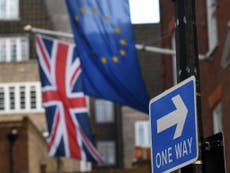Only 17% of Britons think Boris Johnson’s ‘fantastic’ Brexit deal is good for country
Just 27% of Leave voters say the agreement is a success – and only one in three Conservative supporters
Your support helps us to tell the story
From reproductive rights to climate change to Big Tech, The Independent is on the ground when the story is developing. Whether it's investigating the financials of Elon Musk's pro-Trump PAC or producing our latest documentary, 'The A Word', which shines a light on the American women fighting for reproductive rights, we know how important it is to parse out the facts from the messaging.
At such a critical moment in US history, we need reporters on the ground. Your donation allows us to keep sending journalists to speak to both sides of the story.
The Independent is trusted by Americans across the entire political spectrum. And unlike many other quality news outlets, we choose not to lock Americans out of our reporting and analysis with paywalls. We believe quality journalism should be available to everyone, paid for by those who can afford it.
Your support makes all the difference.The public has delivered an overwhelming thumbs-down to the Brexit trade deal, just 17 per cent saying they think it will be “good” for the country.
Even among Leave voters, only 27 per cent told a survey that the deal was a success – and only one in three Conservative supporters said it was.
But YouGov found that a majority of Britons do want MPs to approve the agreement in the Commons today – by a wide margin of 57 per cent to 9 per cent.
The results are a significant blow to Boris Johnson, as he told MPs it was a “fantastic” deal that had achieved something “which we were told was impossible”.
The 1,255-page agreement is certain to pass through Parliament – with Labour and hard Brexit-backing Tory support – to come in force on New Year’s Day.
The poll shows the public backs the view that the deal must now be passed, with less than 48 hours until the UK leaves the EU single market and customs union.
Even almost half of Labour voters want MPs to vote for it – in line with Keir Starmer’s controversial decision to back it – four times the 12 per cent who want them to block it.
But that does not mean approval of the terms secured, amid criticism of the huge gaps that leaves service industries, the City of London, touring musicians and even the fishing industry high and dry.
The agreement also means a mountain new red tape for cross-Channel traders – who must fill in 200 million new customs forms – with vast queues expected on port approaches in Kent.
It will also leave the UK significantly poorer than EU membership, most economic analysts agree, slashing between 4 and 5 per cent from national income in the years to come.
In the Commons, the prime minister claimed his agreement would provide “certainty” for businesses, protecting jobs after months of wrangling that had threatened a no-deal departure.
He also argued he had managed to have our cake and eat it, by achieving “trade and co-operate with our EU neighbours on the closest possible terms as we will while retaining sovereign control of our laws and our national destiny”.
“We are going to open a new chapter in our national story, striking free trade deals around the world and reasserting global Britain as a liberal outward-looking force for good,” Mr Johnson said.
But Sir Keir, even while confirming Labour would vote with the government, warned of “significant and permanent burdens on British businesses”.
Warning “the lack of ambition here is striking”, the Labour leader added: “It will make it harder to sell services into the EU.
“So we're left to wonder either the Prime Minister did not try to get a strong deal to protect our service economy or he tried and failed. Which is it?”
* YouGov surveyed 7,999 adults across Great Britain on 29 and 30 December.






Join our commenting forum
Join thought-provoking conversations, follow other Independent readers and see their replies
Comments